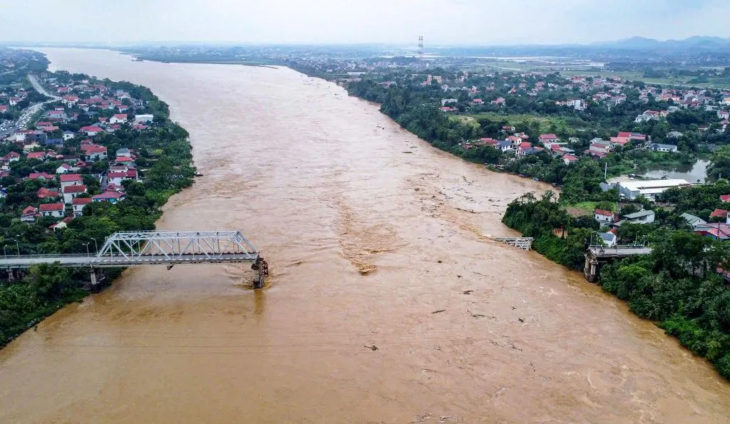A busy bridge in northern Vietnam has collapsed in the wake of super typhoon Yagi, plunging 10 cars and two scooters into the Red River, Deputy Prime Minister Ho Duc Phoc said on Monday.
At least three people have so far been rescued and 13 are missing after the Phong Chau bridge in Phu Tho province collapsed, Mr Ho added. It is unclear if there have been any deaths.
Part of the 375-metre (1230 feet) structure is still standing, and the military has been instructed to build a pontoon bridge as soon as possible.
Yagi, Asia's most powerful storm this year, has killed more than 60 people since it made landfall in Vietnam on Saturday, bringing strong winds of up to 203 km/h (126 mph).
In the days since, the storm has wreaked havoc in northern Vietnam.
At least 44 victims were killed by landslides and flash floods, the country's Ministry of Agriculture and Rural Development said on Monday - a 68-year-old woman, a one-year-old boy and a newborn baby among them.
More than 240 people have been injured, while some 1.5 million are still without power.
The typhoon also tore roofs from buildings and uprooted trees.

Although it has weakened into a tropical depression, authorities have warned of more flooding and landslides as the storm moves westwards.
In the Yen Bai province, flood waters reached a metre (three feet) high on Monday, with 2,400 families moved to higher ground as the water levels rose, AFP news agency reported.
Yagi also sunk and swept adrift dozens of fishing boats. On Sunday, search and rescue personnel found 27 people drifting at sea after a dozen fishermen were reported missing.
Nearly 50,000 people have been evacuated from coastal towns in Vietnam, with authorities issuing a warning to remain indoors.
Schools were temporarily closed in 12 northern provinces, including Hanoi.
Before hitting Vietnam, Yagi left 24 people dead across southern China and the Philippines.
Scientists say typhoons and hurricanes are becoming stronger, more frequent and staying over land for longer due to climate change. Warmer ocean waters mean storms pick up more energy, which leads to higher wind speeds.
A warmer atmosphere also holds more moisture, which can lead to more intense rainfall.
Latest Stories
-
Miss Health Ghana 2024: Kujori Esther Cachana crowned new Health Ambassador
6 mins -
Livestream: The manifesto debate on WASH and climate change
12 mins -
Alan Kyerematen saddened by NDC and NPP’s neglect of Krofrom Market in the Ashanti Region
15 mins -
CSIR Executive Director urges farmers to adopt technology for improved farming
29 mins -
Football Impact Africa’s Ghetto Love Initiative inspires change in Teshie
40 mins -
Peter Toobu calls for tighter border security over uncovered weapons at Tema Port
43 mins -
Gov’t has failed its commitment to IPPs – Ablakwa
47 mins -
Sell Chrome to end search monopoly, Google told
58 mins -
KATH to install seven new dialysis machines by end of November
1 hour -
Walewale: Police confiscate 37 bags of cocoa beans suspected of being smuggled out of Ghana
1 hour -
‘Expired’ Rice Scandal: FDA confirms rice was safe for consumption after rigorous lab tests
1 hour -
Many women have experienced intimate partner violence – Angela Dwamena Aboagye
2 hours -
Power challenges persist due to government’s mismanagement of revenues – Okudzeto Ablakwa
2 hours -
Jordan Ayew injury not as bad as feared – Leicester City boss
2 hours -
Stonebwoy heads to North America for UP & RUNNIN6 tour
2 hours

